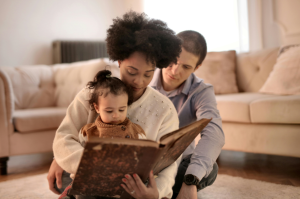 As a child therapist, and as a parent, I believe in the power of bibliotherapy. Reading about worries, social challenges, and big life changes is one of the most effective strategies to help your child learn about and cope with their feelings. May is Mental Health Awareness Month and reading to your child is both preventative and mitigative in your child's journey towards well-being.
As a child therapist, and as a parent, I believe in the power of bibliotherapy. Reading about worries, social challenges, and big life changes is one of the most effective strategies to help your child learn about and cope with their feelings. May is Mental Health Awareness Month and reading to your child is both preventative and mitigative in your child's journey towards well-being.
What is Bibliotherapy and why does it work to help kids process emotions?
Bibliotherapy is the use of specially curated books for children (or adults) that help them process feelings and understand themselves and the world around them. Bibliotherapy is frequently used by counselors providing mental and behavioral health services. When parents use it, the precise term is Developmental Bibliotherapy. Kids love stories… that they hear, watch, read, and invent. Stories allow them to put a little distance between themselves and struggles they might be having and to connect emotionally with characters so that they don’t feel alone in their struggles. Books can help caregivers introduce words and concepts that help kids understand emotions and social dynamics. Even the experience of being read to builds resiliency. The time that kids spend with an adult reading to them promotes attachment and well-being simply because of the undivided attention that they are receiving. Research on bibliotherapy underscores all of the benefits that it provides, including building empathy and helping kids with emotional regulation.
Where do I start?
- Identify topics
Is your child struggling with hitting? Dealing with the loss of a pet? Needing to understand divorce? Wanting to learn more about emotions? There are children’s books for all of these topics and more.
- Find trustworthy sources to recommend books
Your child’s teacher or pediatrician are great sources of recommendations. Other parents and trusted online sites are great ways to discover titles. Be cautious with internet searches if you don’t know much about the person or organization recommending the books and always read through the book prior to reading it out loud to your child. Child Mind Institute is a great source and this article, 77 Children’s Books About Mental Health, is what prompted me to write this blog.
- Get the books and prepare to read them over and over
I often recommend that caregivers buy books that they want to use for bibliotherapy because kids love to hear stories (read books, watch shows, hear you tell about something) over and over. Developing mastery and preference for the familiar are two developmental reasons that kids like repetition.
What if reading a book isn’t enough?
If your child is struggling with an emotion or a situation and reading about it just isn’t enough, speak with their pediatrician or consult with a child therapist. Some signs that your child might benefit from counseling include: feels bad about themselves, withdraws from family/friends/activities they used to enjoy, significant changes in sleeping/eating, expresses excessive worry, or has problems in multiple areas of their life (for example, home and school).
